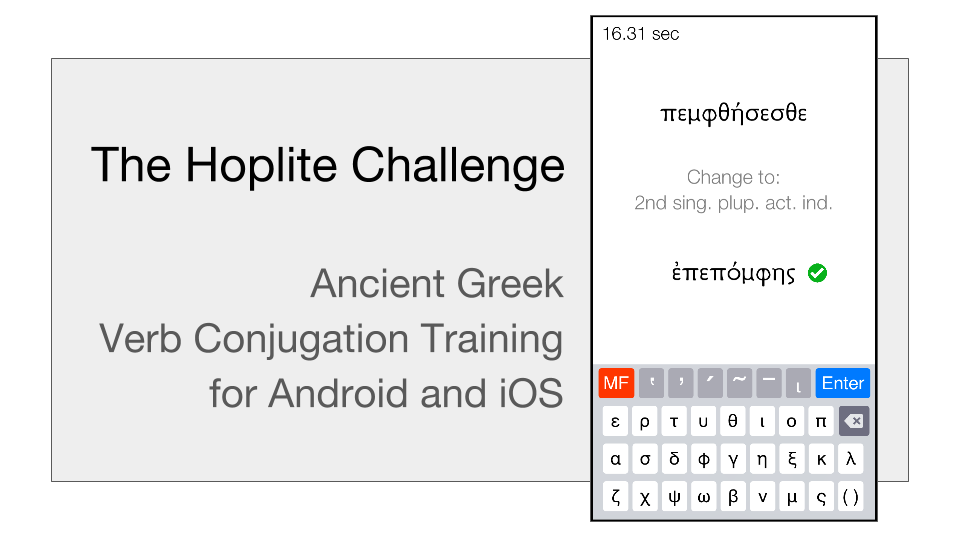
The Hoplite Challenge is an iOS and Android app being developed to drill students on Ancient Greek verb conjugation. It is based on the Hoplite Challenge Cup, an event held halfway through the Latin/Greek Institute’s (LGI) basic Greek course, where the faculty and students compete to change Ancient Greek verbs from one form to another before a timer runs out. The Hoplite Challenge app asks the user to make similar transformations to verb forms while a timer ticks down. LGI is famous for the intensity and rigor of their 10 week summer intensive Greek and Latin courses. The Hoplite Challenge app attempts to capture that same intensity and rigor in a format students can carry with them.
The first step to creating the app was to teach it how to conjugate Ancient Greek verbs. Greek verbs are known for being particularly thorny with six principal parts being required to conjugate the verb in all tenses, voices, and moods. Early in the development, the decision was made to code the app to conjugate the verbs forms from their principal parts in the same way humans do rather than simply selecting them from a database of forms. By coding the app to conjugate the verbs not only can the app conjugate new verbs simply by entering their principal parts, but it can also walk the student through the steps for arriving at each form. How a verb form is generated from the principal parts can be pretty opaque in many cases, so to be able to demonstrate this process for all forms can save students from hours of confusion.
Now that the app can conjugate Greek verbs, the next step will be to add more intelligence to the choice of which forms the app prompts students to generate. Currently this selection is almost entirely random, but experienced teachers know that some transformations are more elucidating than others. The app will also be given machine learning capabilities to allow it to adapt to a student’s pace and to focus on his or her areas of weakness.
One of the biggest challenges in developing the app was the keyboard. Ancient Greek vowels can have up to four different diacritic marks at once. There has never been a standardized way to add diacritic markings with a keyboard–each implementation is different and each has its own drawbacks. On PC keyboards accents and other diacritic marks are usually assigned to a number or other non-letter key. There are so many combinations few people ever memorize more than the most basic set. But the soft keyboards on iOS and Android offered a chance to rethink the polytonic Greek keyboard. Since the Hoplite Challenge is a timed game and requires quick and accurate input, it was essential that the keyboard be as efficient as possible. Keys for the required diacritics were put on the top row for easy access, not buried in deeper levels of the keyboard. The keyboard is smart enough to only add accents in places where they are legally allowed. In most implementations it is quite easy to arrive at illegal combinations forcing you to delete the whole character and start again. In the Hoplite Challenge keyboard, pressing an accent toggles it on or off, so mistakes can easily be remedied and the vowel will never be in an inconsistent state. Adding a diacritic to a character which already has a contrasting diacritic will replace the existing diacritic with the new one. The keyboard will also be released as a standalone addon keyboard, so that it can be used by other apps. It is hoped that having a keyboard which is intuitive and “just works” will facilitate the development of a new generation of Ancient Greek apps.
The Hoplite Challenge app is expected to be released for iOS and Android early in 2016.





